Kindling the Fire That Keeps Us Teaching
A MiddleWeb Blog
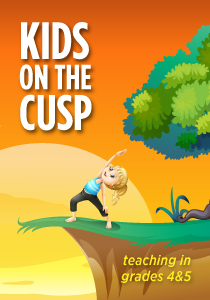 Report cards were due this past Thursday. They went home to parents on Friday. They are the third “official assessment” of the 2015-2016 school year.
Report cards were due this past Thursday. They went home to parents on Friday. They are the third “official assessment” of the 2015-2016 school year.
These “results” contain a narrative portion, or in my mind, the only detailed and accurate description of each child’s true progress this marking period. This is the most important part of report cards for me. The comments.
As a teacher, I find standardized scores are of very little use to me. The powers that be seem to find a valuable use for this testing, but I have yet to understand the complexities of their reasoning. I just have to administer them as part of my job requirements.
PARCC’s point of view
The official PARCC website, the makers of the test, assures us that “The score report provides clear and meaningful information about the extent to which students are acquiring and mastering the knowledge and skills they need to succeed in school.”
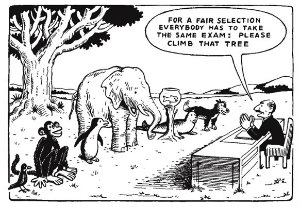
“This information is shared through sophisticated online reports for schools and teachers, and through an informative, easy-to-understand printed report for parents.”
Really? I will admit that the one page report I received in the mail for each of my own two children (the one with the up, down, or sideways arrows) was really easy to understand. But it didn’t give me any real insights into my kids’ learning or their actual achievement.
PARCC’s small perks
Thankfully, PARCC testing is over. My nine and ten year olds are happy about this. They want to get back to our life in the classroom, which is way more enjoyable, and does, in fact, enhance our learning.
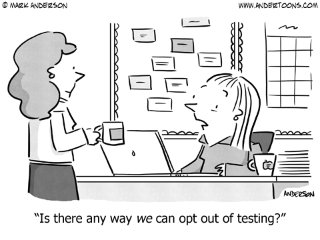
Admittedly, there were certain aspects of the testing that the kids did like. We joined another class in the library each testing session, so it was a little exciting for them to see some of their buddies during the school day. This novelty wore off by day three. We also assigned no homework during testing weeks. The kids sure didn’t mind that one bit!
We also enjoyed a coupla’ extra games of four-square out on the playground, on an afternoon or two, after testing was completed. The four-square helped all of us. We needed the distraction, as well as some exercise and a little levity.
I don’t like PARCC testing very much (can you tell?). Sure, it has its perks, like those two weeks of homework assignments that I didn’t have to grade at home, after dinner…and the aforementioned four-square. The body needs to be stretched, as well as the mind, and PARCC testing takes its toll on both.
A return to learning
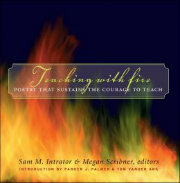
Channeling my inner child and some forgotten childlike whimsy, I closed my eyes, asked for some inspiration, and opened to a page. Looking up at me was a poem entitled “On Turning Ten.” I smiled as I settled in to read it, awaiting the joy that only the perspective of childhood can bestow.
Former U.S. poet laureate Billy Collins’ poem was not what I expected. His description of the loss of childlike fantasies, told through the eyes of a young child, made me profoundly sad. I had been looking for hope, but instead, a sense of loss flooded into my chest.
This is the beginning of sadness, I say to myself,
as I walk through the universe in my sneakers.
It is time to say good-bye to my imaginary friends,
time to turn the first big number.
There was a small bit of comfort in knowing that Collins’ poem had affected someone else, though. I decided to find out who that was. My eyes shifted to the left, to see who had selected this particular piece for the collection.
Sharing a reflection: Chip Wood
The reflection was written by a principal from Massachusetts whose name is Chip Wood. Wood explains that Collins’ poem brought him “right into that bittersweet territory of fence-sitting, between childhood and adolescents,” and warns us that, “We, in fact, are in danger of leaving childhood behind in the wake of our own preoccupations.” I like this guy!
A quick Google search gave me even more reasons to admire Chip Wood and to discover what other connections might exist, beyond our mutual melancholy over Collins’ wisdoms. He was also a co-founder and co-developer of The Responsive Classroom teaching framework, and executive director of its non-profit organization, Northeast Foundation for Children. He’s now at The Center for Courage and Renewal.
Best of all, Wood was a teacher and principal for many years, using poetry as a means to spread a message. Wood discusses that message and his life’s journey in an article I stumbled upon out in cyberworld.
I was intrigued as I read about his work with the Fetzer Institute’s “Courage to Teach.” A quote from an old link to the program popped off the page.
Twenty-five teachers and administrators sit in a circle, giving their full attention as an elementary teacher speaks passionately, and poignantly, about her love for her students and her commitment to reach each and every one of them. She goes on to tearfully describe the personal toll this is taking on her own life—creeping guilt at not having enough time or emotional energy to give to her own family, bone-deep exhaustion, non-stop worrying about the safety of some of her students, the weariness of facing an always burgeoning mountain of papers and projects to grade, a sense of increasing isolation from friends and colleagues because there is simply no more to give. The listeners sit quietly, respectfully, as she finishes, each reflecting on their own version of her story.” Source
Adding kindling to the fire
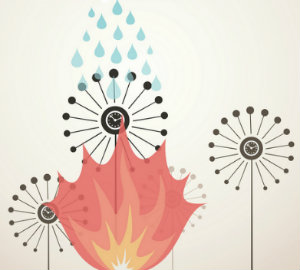
The end of testing, the writing of report card narratives, and the closing of our third marking period are signs that the year is drawing to a close. The year may be dwindling down, but I don’t ever want the fire to die out.
I need remember to add kindling to the flame and to stoke the embers. This is what truly enhances my teaching…and my students’ learning.
Thank you for reminding me about what really matters, Mr. Wood.




































The cartoon depicting different species of animals having one activity to do is a pretty funny stretch; I assume we all teach only 1 specie!
As long as government is involved with education, there will be testing. It gets more important to them every year. For “efficiency’s” sake, they require measurement from a baseline of questions that can be referenced. Of course there will never be a perfect test. What actually would the author suggest?
Getting rid of the Federal Department of Education and you having more local control would do wonders for the current “testing: environment.
Thanks for your thoughts, John…I found that cartoon on a website created by parents who were angry about PARCC’s inception here in NJ last year…the disparity of “skills” just really hit home.
I don’t think getting rid of the Department of Education is anywhere in the near future, but it irks me when they grant an enormous sum of money to test makers, instead of investing those millions into the actual schools they want to improve, waiting for the benefits to occur…and then testing the kids (if they must).
Knowing that my parents get good feedback from me about their kids helps me deal with my frustrations with Big Education…it’s a delicate balance though!..hehehe…